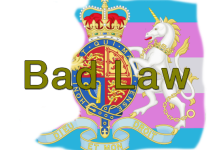Here is the reply from the EHRC to our letter hand delivered to the EHRC
The response was titled 404 HarneEHRC response. 404 is the prefix to error pages and as such went in to our spam bin. Yes google recognised it as spam. So do we.
Here is their pitiful, inadequate response to genuine concerns from lesbians as a protected characteristic:
Dr. Lynne Harne
Our ref: 404 Harne
By email:
Monday 23 December 2019
Dear Dr. Harne,
Subject: Response to letter from Lesbian Rights Alliance
Thank you for your letter of 9 December. We recognise that the area of sex, gender and transgender rights (and in particular the interplay between sex and gender) comprises both a complex field of law and the subject of significant and important public debate.
The Commission works to enhance public understanding of, and ensure compliance with, the Equality Act 2010 under which, as you know, the characteristics of sex, sexual orientation and gender reassignment are all protected. Equality considerations for all protected characteristics under the 2010 Act, including sexual orientation and sex, are integrated into the Commission’s work across our core and priority aims, as set out in our Strategic Plan.
With respect to the protected characteristic of sexual orientation and issues affecting lesbians, the Commission has work programmes in a number of areas, including our work on hate crime, on addressing data gaps and on tackling prejudice-based bullying. For example, we have conducted research to understand better the link between prejudicial attitudes and unlawful behaviour, and the findings of this research is informing our work on the role that schools can play in reducing prejudice, as part of our work to ensure that the education system promotes good relations and respect for equality and human rights.
Our work specifically on the interplay between sex and gender aims to help people understand the law, and in particular the interplay between the 2010 Act and the Gender Recognition Act 2004, which is a particularly complex area of law. We support a trans-inclusive approach and recognise concerns about the balancing of rights in this area.
Your letter raises a number of concerns with respect to the single-sex exceptions in Schedule 3 to the 2010 Act. As you know, the 2010 Act includes exceptions that allow services to be provided separately for each sex or exclusively for one sex in certain circumstances. This must always be a proportionate means of achieving a legitimate aim, and certain conditions must be met depending on which exception is applied. The statutory code of practice provides more information on the relevant conditions along with practical examples.
We encourage providers of separate- or single-sex services to take an inclusive approach and to treat individuals according to the gender with which they identify. As you know, the Act does, however, permit providers to exclude transgender people or to provide services differently if this is a proportionate way to achieve a legitimate aim. This requires providers to assess the importance of their policy aim in providing a single-sex service and to balance that against the effect the policy will have on transgender people who would like to use the service. It also requires providers to consider whether there is a less discriminatory or non-discriminatory way to achieve the policy aim.
As mentioned in our response to the Women and Equalities Committee’s inquiry on Enforcing the Equality Act, we are working to identify whether there is a practical guide for service providers that would assist with their decision-making.
With respect specifically to concerns around domestic abuse, which you mention in your letter, we are prioritising work in this area under our Priority Aim 3 (Access to Justice), where we are working to ensure that barriers to justice for women and girls who have survived violence are exposed and reduced. We recognise that the crime of domestic abuse impacts women disproportionately, and that men are far more likely than women to be perpetrators, and we have called on the government to ensure adequate funding for domestic abuse services, including single-sex services. Our Parliamentary Briefings on the Domestic Abuse Bill contain more information on our positions in this area.
As you mention, we are also preparing guidance to help schools understand their responsibilities under the 2010 Act. This is in response to a need identified by schools to have clear guidance on their legal responsibilities towards trans pupils, whilst balancing the needs of all children to create an inclusive environment. We are in the process of making sure everything is ready for publication, and have carefully considered all comments provided to us as part of this process.
Your letter raises a number of specific points with respect to the actions or language of a number of organisations, including Stonewall, the Corporation of the City of London, the NHS and the Liberal Democrat party, and requests us to use our legal powers. We remain vigilant as to any breaches of the 2010 Act, by any organisation on any relevant matter, and consider any issues arising under our strategic plan and internal prioritisation procedures. We have recently published our litigation and enforcement policy 2019 to 2022. This includes a section (at page 11) on how legal representatives and organisations can contact us to ask us to use our legal powers. We would ask that you follow the procedures and guidelines set out in this document for requesting use of our legal powers. Individuals seeking help on relevant issues should contact the Equality Advisory and Support Service.
Yours sincerely,
Rebecca Hilsenrath



